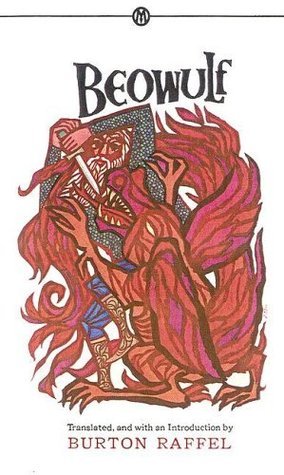- The Good: Monsters, kings, honor, and combat!
- The Bad: Sometimes difficult to follow; prepare to read as a poem instead of prose
- The Literary: One of our oldest English stories!
One of the most important works of Old English literature and dating from at least as far back as the year 1000, Beowulf is an epic poem about the hero Beowulf, who defeats three monsters.
In short, King Hrothgar’s mead hall is attacked several times by the monster (and half giant) Grendel, who slaughters and eats men. Beowulf arrives from a distant land by ship, a young, brash, and ultimately brave man. He defeats Grendel by mortally wounding him after he attacks the mead hall for the last time. Shortly thereafter, Grendel’s mother comes for her revenge, but Beowulf defeats her too, before sailing home, and reigning as king for 50 years. Beowulf’s last act is to defeat a new monster, a dragon, recently awakened by a man who steals a cup from his horde.
The plot is surprisingly tight for a story from possibly the 6th century. Even compared to children’s fables of just a few centuries ago, this feels like it has a complete plot with increasing stakes and a protagonist who grows. It’s difficult to know how much of the story was added on or changed as it passed orally through the centuries, until it was written down a thousand years ago. My biggest critique is lack of clarity between scene changes or gaps in time.
I love the mashup of pagan and Christian references, which really sparks my curiosity about what was happening in Scandinavia during that time. It feels pagan with its monsters and kings, so the references to God, heaven, and the Flood are quite jarring. There are so many relationships and ideas in this setting that are fascinating from a historical perspective, but very foreign to me. For example, everyone respects and looks up to their kings (and sometimes queens), and in turn, the royalty take care of their subjects. Several bad rulers are mentioned in side stories, so it’s clear the author has high expectations of the king or queen because they play such a central role to society.
There’s a lot of politics and local geography in this that never quite clicks into place for me. Suffice it to say that there are several factions of people living in Sweden and Denmark, and greater Scandinavia generally, with their own rich histories, who don’t always see eye-to-eye across kingdom lines. There’s also a lot of swords. Swords with names and histories and imbued with magic or disgrace.
Beowulf is also one of the most translated works of literature, with one of the most famous in recent times by the Irish poet Seamus Heaney. But this review will not focus on the differences between translations. I first read Beowulf in high school, and now again for a book club, using the same paperback copy with a translation into modern English by Burton Raffel. I’d recommend it as an approachable and portable edition for the beginner.
I can’t end my review without mentioning Tolkien, who has his own translation, by the way, and who clearly loved this text. I can see how The Hobbit and The Lord of the Rings were highly influenced by Beowulf, and it’s wonderful to see the underpinnings of some of the greatest fantasy works of all time.
There’s a story here about a hero named Beowulf, but I recommend this mostly as a fascinating historical text! Easily one of the most important writings of the English language.
